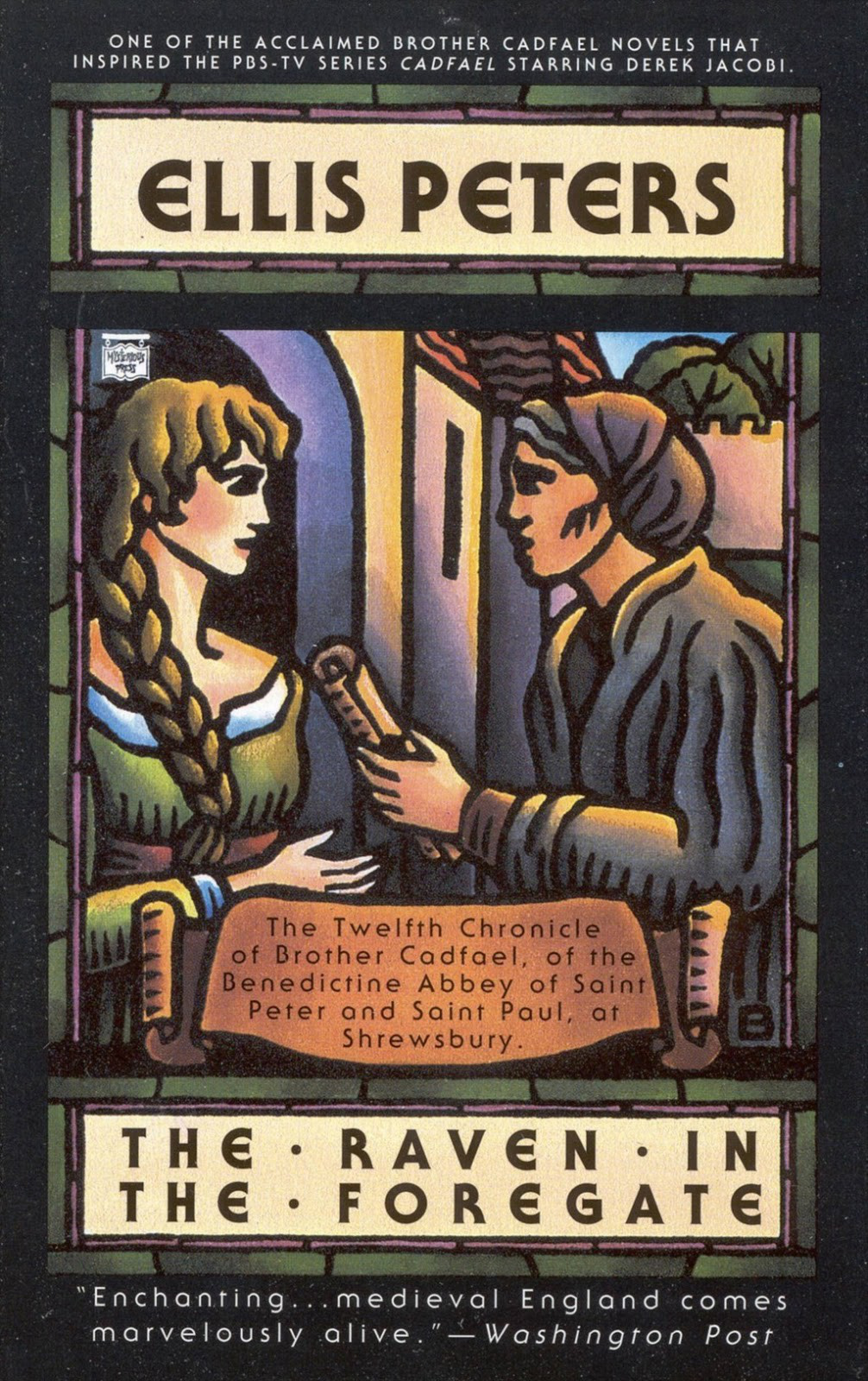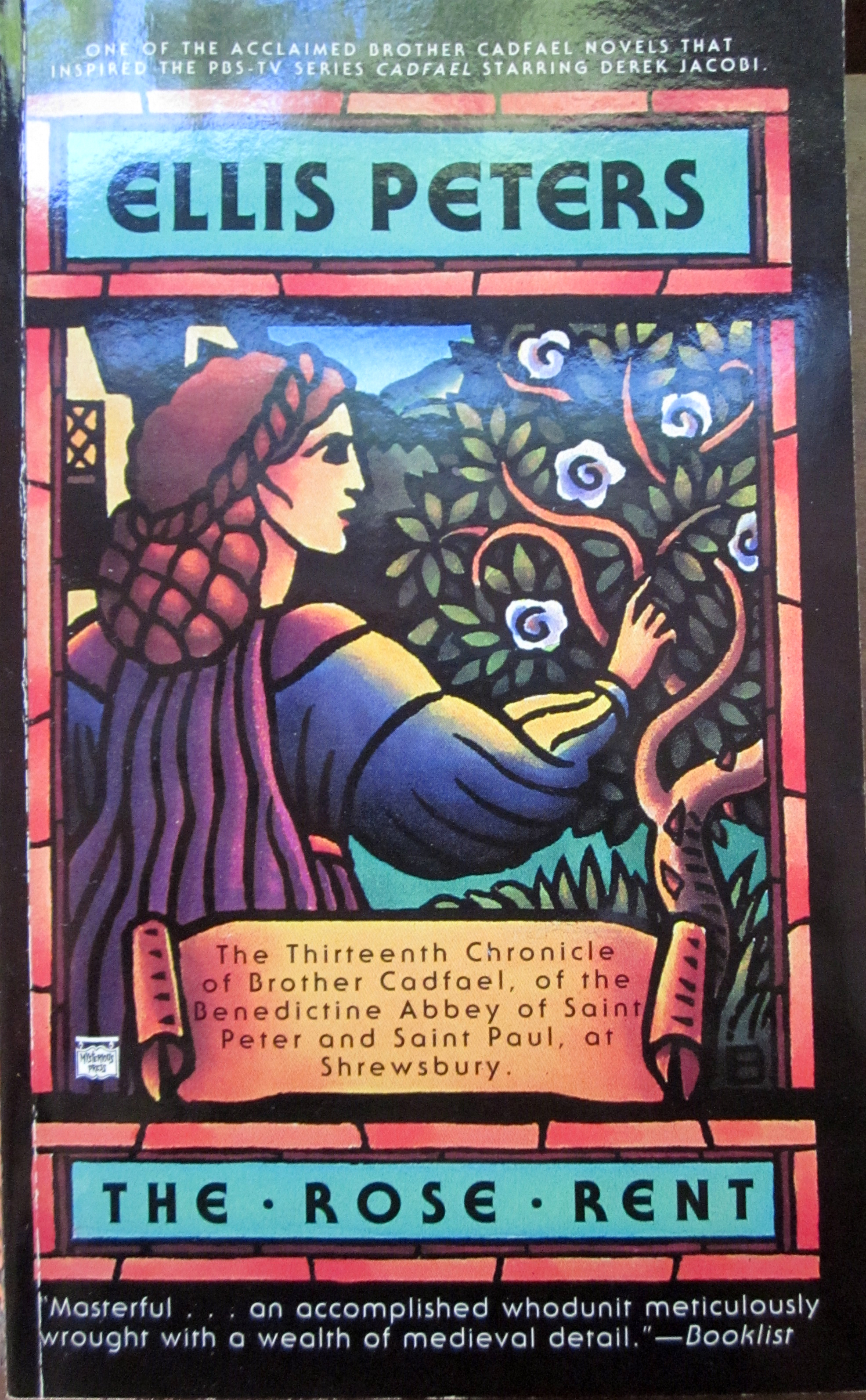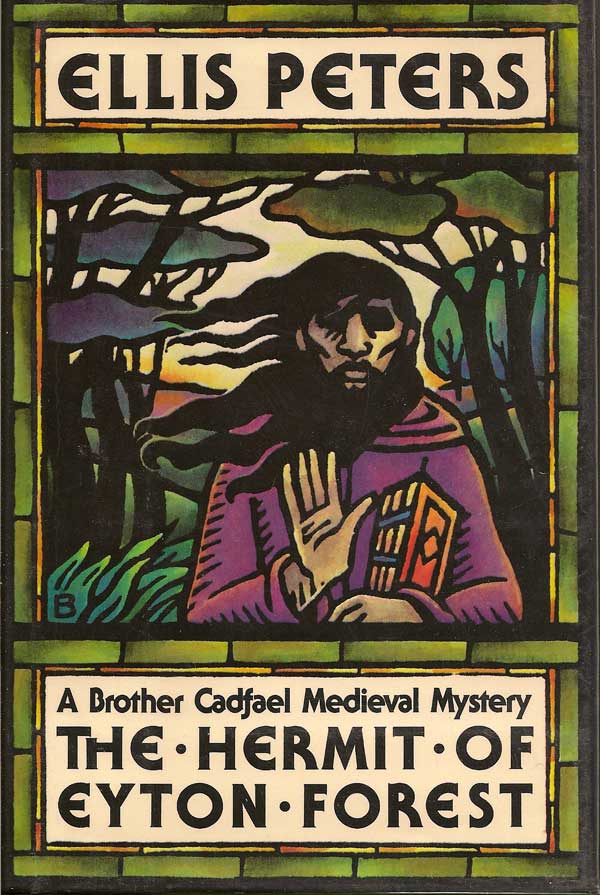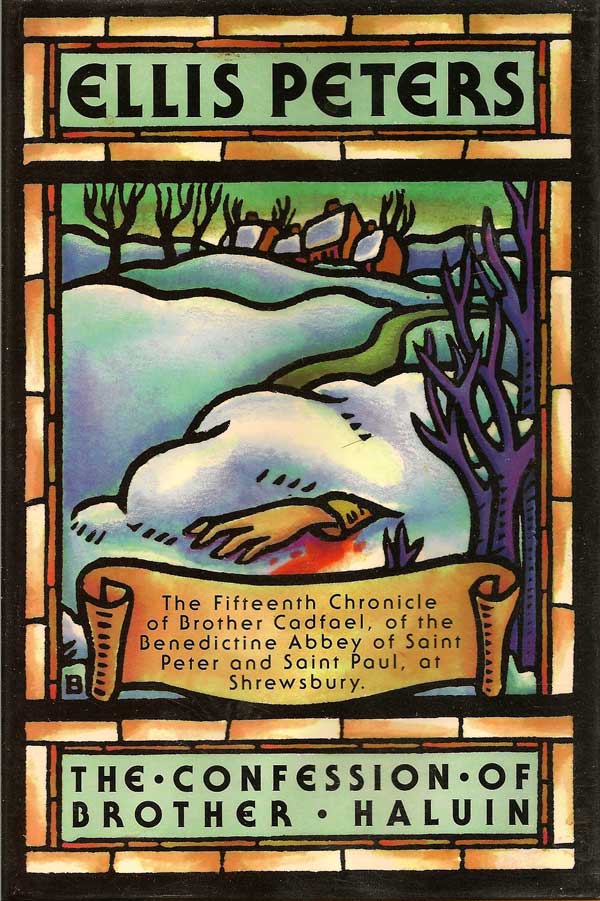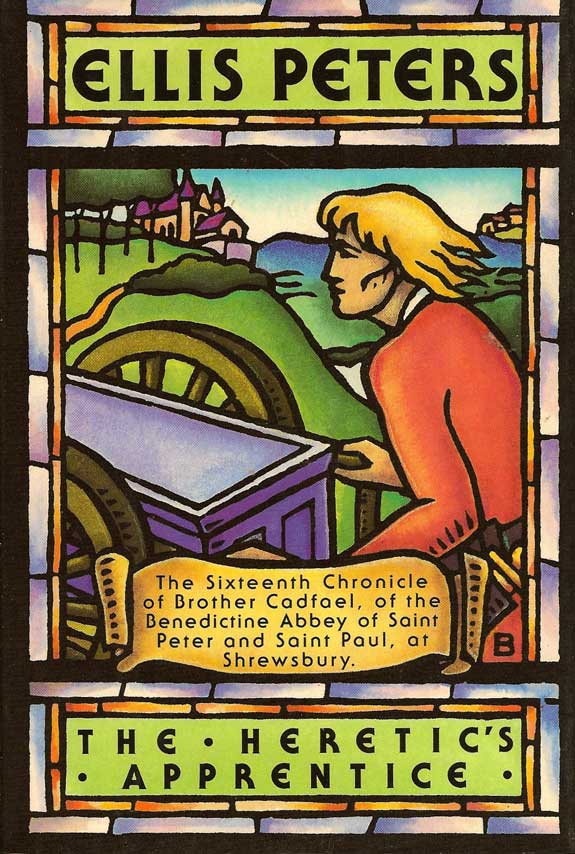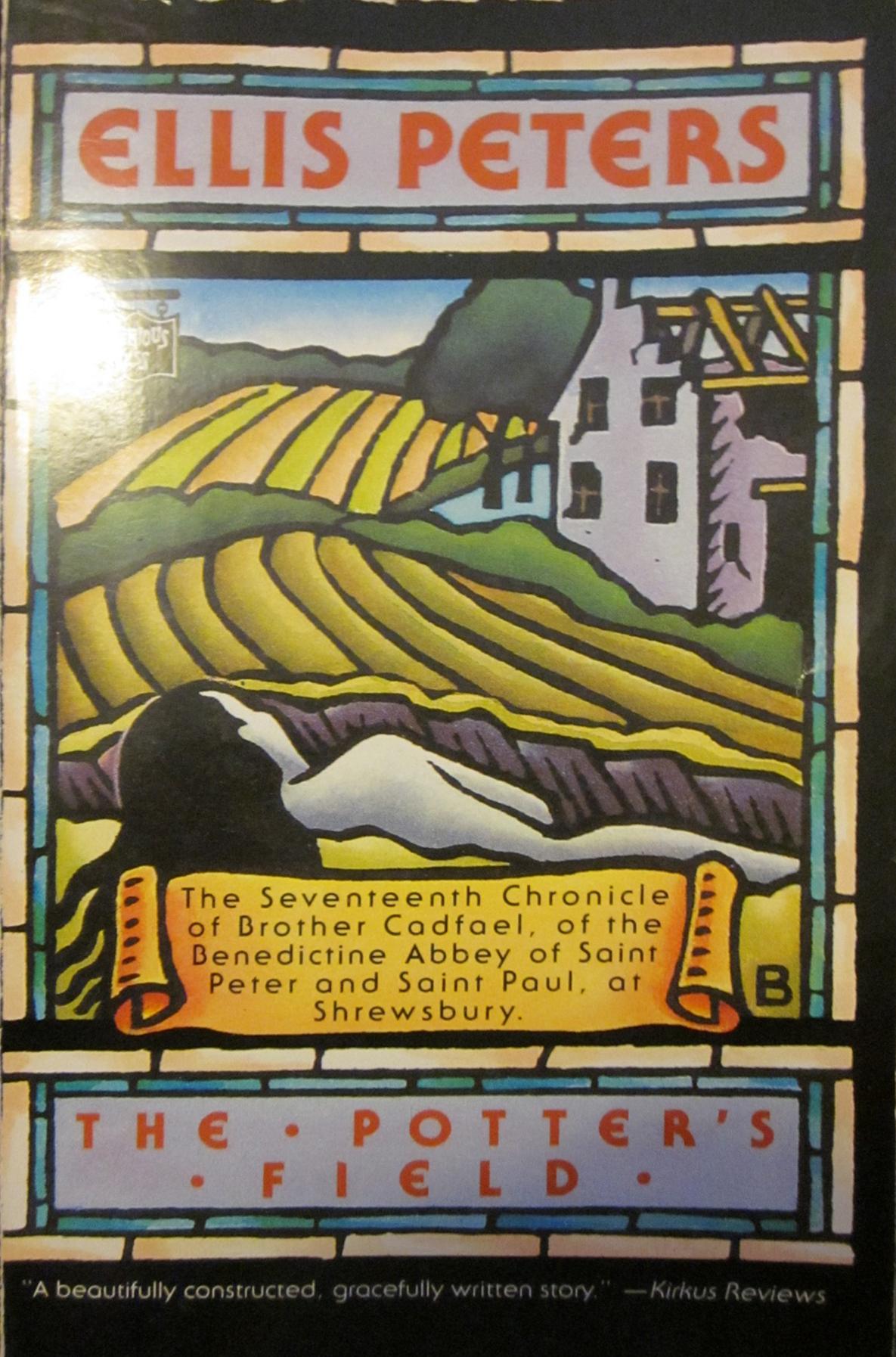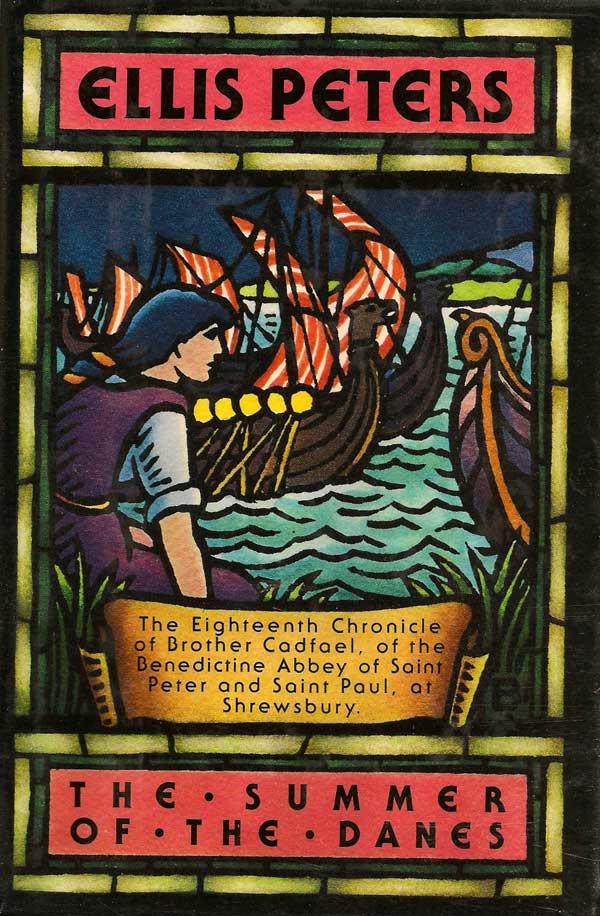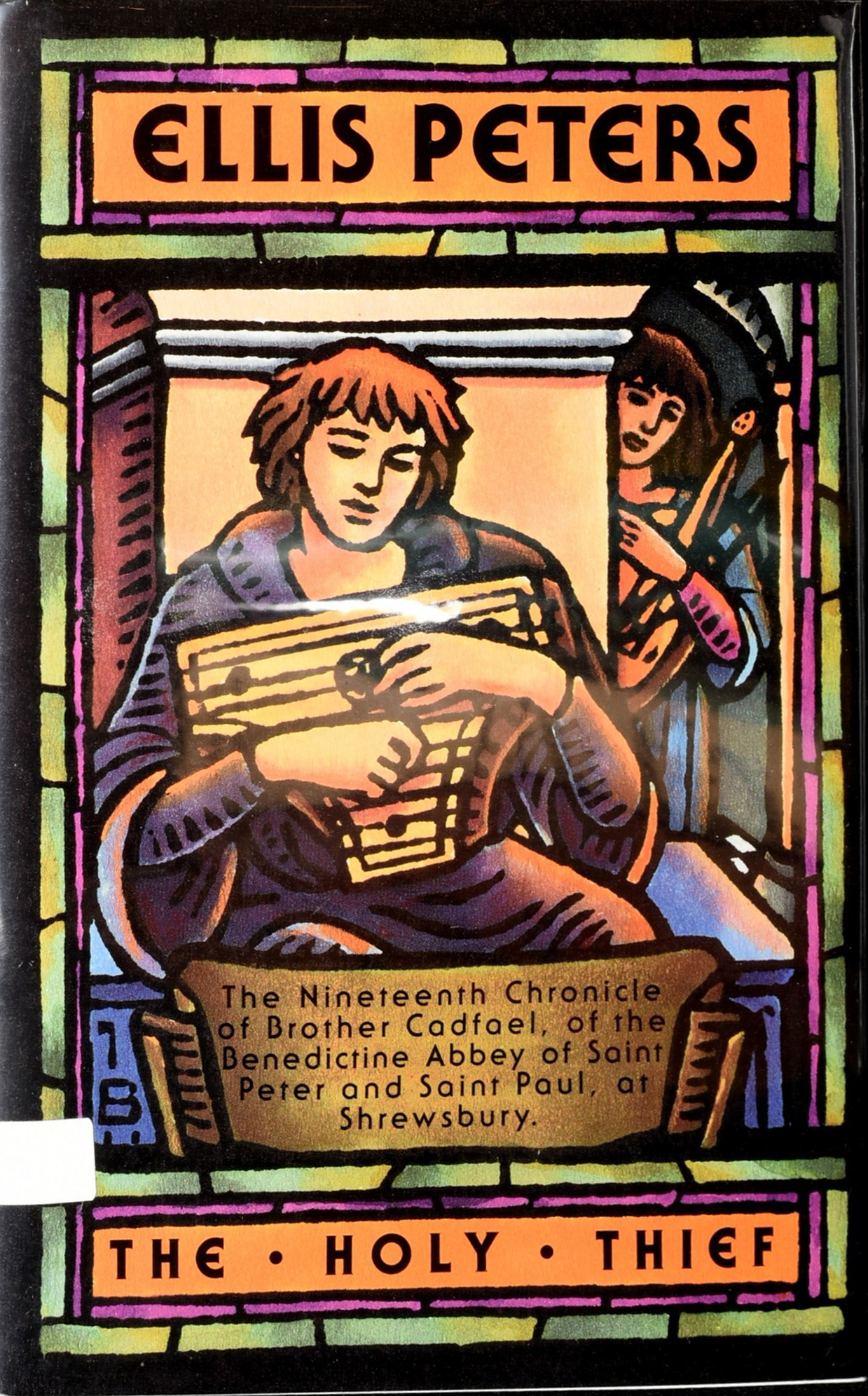Ellis Peters (Edith Mary Pargeter)
Books: Mystery | Historical
Brother Cadfael: A Morbid Taste for Bones (1977), One Corpse Too Many (1979), Monk's Hood (1980), Saint Peter's Fair (1981) The Leper of Saint Giles (1981), The Virgin in the Ice (1982), The Sanctuary Sparrow (1983), The Devil's Novice (1983), Dead Man's Ransom (1984), The Pilgrim of Hate (1984), An Excellent Mystery (1985), The Raven in the Foregate (1986), The Rose Rent (1986), The Hermit of Eyton Forest (1987), The Confession of Brother Haluin (1988), The Heretic's Apprentice (1989), The Potter's Field (1989), The Summer of the Danes (1991), The Holy Thief (1992), Brother Cadfael’s Penance (1994)
Felse Investigations: Death and the Joyful Woman (1961)
Death and the Joyful Woman (1961)
Detective-Sergeant George Felse of the county CID is called back to the pub whose opening he'd attended just hours earlier, when the owner–businessman Alfred Armiger–is found dead, with his head bashed in.
But the case becomes complicated when Felse's son Dominic becomes involved, having fallen in love the way only a 16-year-old boy can, with the young heiress who might be suspected of the murder.
(T)hat was the sign – The Joyful Woman. Lovely, isn't it? Goes right back to about 1600.
This was published in 1961, and there are so very many things that were normal at the time but are almost surreal now.
She set an open box of cigarettes and a heavy glass ash-tray on the edge of the desk midway between them.
And then there's this, which in a way is even odder.
George had already observed that no telephone wires approached the house, and that there was a telephone box only fifty yards away at the corner of the road.
How many people do I know who no longer have a telephone line coming into their house? So very many.
Also, they can test for blood type but not get a complete match, which is so strange to think about, although sixty years before that, they wouldn't have been able to test for certain that it was blood.
Also, towards the end of the story one of the characters suffers a blow to the head / concussion, and fascinatingly, they keep the person in bed for a couple of days.
I didn't love this quite as much as the Brother Cadfael books, but it's a police procedural, and things were very different then.
Joe was well known in the seedier outer districts of Comerbourne, where he made regular rounds with his pony-cart, collecting rags and scrap, and a good many residents automatically saved their cast-off clothes for him. It was worth making regular use of him, because he would take away for you all kinds of awkward and unmarketable rubbish on which the Cleansing Department tended to frown if it was put out for their attentions.
Of course, I already have the next book ready to read.
Publisher: MysteriousPress
January 2022 | Rating: 7/10
A Morbid Taste for Bones (1977)
 Set
in England and Wales in ~1137.
Set
in England and Wales in ~1137.
I picked this up on sale–and by accident. I'd confused Ellis Peters with Peter Tremayne (whose real name was Peter Berresford Ellis, so it's not that ridiculous of a mistake) and so picked up a bunch of these books when they went on sale.
It was a very good mistake to have made.
Brother Cadfael is a Welsh Benedictine monk and herbalist living in Shrewsbury, on the Welsh border. He came late to his calling, having spent his early years as a Crusader, and enjoys his life or order and peace, but because of his colorful past, knows much more of the world than most of his brothers.
Which is one of the things I particularly liked about Brother Cadfael–he knew about the world, and was patient with those living in it. He seems like he would have been a marvelous person to know, even if he wasn't willing to talk about his past as a crusader.
One thing to note–this book was written in 1977, so there are anachronisms, but they didn't especially bother me, because they weren't glaring errors, and it wasn't as easy in the 70s to check the etymology of a word as it is now. And they really are only minor things.
Meanwhile, there was very much to love.
The abbey, like to many of the time, was searching for the bones of saints to bring to the Shrewsbury Abbey of St Peter and St Paul.
He had been scouring the borderlands for a spare saint now for a year or more, looking hopefully towards Wales, where it was well known that holy men and women had been common as mushrooms in autumn in the past, and as little regarded.
When a possible candidate is discovered, Brother Cadfael wrangles himself along as a translator (and also brings along his assistant, about whose calling he has doubts).
Not that he's able to keep those in his company from making mistakes.
"Money!" said Rhisiart in the most extraordinary of tones, at once curious, derisory and revolted. He knew about money, of course, and even understood its use, but as an aberration in human relations.
But what I like best is Brother Cadfael himself. Despite his past (or perhaps because of it) he has a true calling, but doesn't take himself (or most around him) seriously.
Meet every man as you find him, for we're all made the same under habit or robe or rags.
(L)eave agonising too much over your sins, black as they are, there isn't a confessor in the land who hasn't heard worse and never turned a hair. It's a kind of arrogance to be so certain you're past redemption."
"It's a kind of arrogance to be so certain you're past redemption." That is a very interesting statement–one I hadn't heard before.
As you can probably guess from that, Brother Cadfael is a great proponent of redemption, and it's one of my favorite themes, so along with a fascinating and well-done mystery, this was a very enjoyable story.
Characters: Abbot Heribert, Annest, Bened, Bishop David of Bangor, Brother Cadfael, Brother Columbanus, Brother Jerome, Brother John, Brother Rhys, Cadwallon, Cai, Engelard, Father Huw, Griffith ap Rhys, Owain Gwynedd, Peredur, Prior Robert Pennant, Rhisiart, Richard, Sioned
Published by MysteriousPress
- October 2016 | Rating: 8.5/10
- July 2018 | Rating: 8/10
- May 2024 | Rating: 8.5/10
One Corpse Too Many (1979) #2
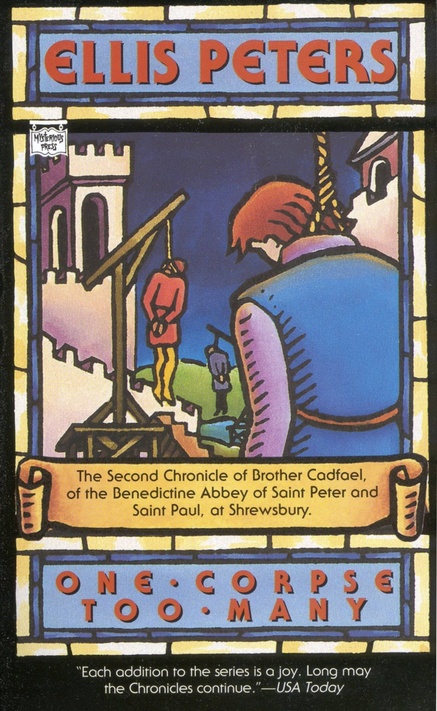 Set in
Shropshire, England in 1138.
Set in
Shropshire, England in 1138.
I enjoyed the second book as much as–if not more than–the first.
Civil War is come to Shrewsbury as Maud and Stephen battle for the throne of England. (I actually had to go back and peruse She-Wolves, to see is Maud was mentioned there.)
When Maud's supporters are put to death after Stephen wins the battle, Cadfael and the brothers at the Abbey help prepare the dead, and bury any who are not claimed by their families. It is as they are finishing these preparations that Brother Cadfael realized that there are more bodies laid out than were executed, and thus begins the mystery.
One of the things I liked was both the horror of the execution of so many many and the commonplace of the preparation of the dead.
In the house of Father Elias, priest of St. Alkmund's church, (the man) was reverently stripped, washed, composed and shrouded, all by his sister's hands, the good father assisting. Hugh Beringar stood by to fetch and carry for them, but did not enter the room where they worked. She wanted no one else, she was quite sufficient to the task laid on her.
It's a very subtle reminder of how much things have changed–of how death and dying have become a stranger to our lives.
I again enjoyed Brother Cadfael's wit and way of looking at the world.
"I can hardly question your judgment of men," said Cadfael drily, "since you've confided in me. If I doubted, I'd hardly be likely to own it."
Again, there were a couple anachronisms–"the plague" wasn't in use until the 14th century (which I knew because of another historical mystery series I recently read) but as the book was written in the late 70s, I can hardly fault the author for being off by 200 or so years in a work of fiction.
I enjoyed this story very much, and Brother Cadfael's look on life.
Characters: Abbot Heribert, Adam Courcelle, Aline Siward, Anselm, Louis, Bishop Roger of Salisbury, Cadfael, Paul, Edric Flesher, Father Elias, Gilbert Prestcote, Giles Siward, Godith Adeney, Hugh Beringar, King Stephen, Lame Osbern, Nicholas Faintree, Petronilla, Torold Blund, Ulf, Willem Ten Heyt
Published by MysteriousPress
- October 2016 | Rating: 8.5/10
- July 2018 | Rating: 8.5/10
- June 2024 | Rating: 9/10
Monk's Hood (1980) #3
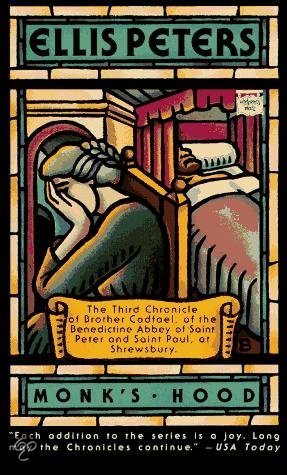 Set in Shropshire,
England in 1138.
Set in Shropshire,
England in 1138.
When a man is murdered, and one of Brother Cadfael's potions is the cause of death, Brother Cadfael is determined to seek out the person who so misused his medicine.
There are some interesting points of law here, a reminder of how much things have changed, as well as how different things could be from one country to another.
Not even the church would argue a bastard's right to inherit, while the state would deny it even where marriage of the parents, every way legal, followed the birth.
Another interesting sub-plot was the uproar in the Abbey as the abbot is sent to London, and Prior Robert assumes that he will become the abbot in his stead. Which would be bad not just for Brother Cadfeal, but for all the brothers.
Although there were some slow parts, I did enjoy this mystery.
Characters: Cadfael, Jerome, Abbot Radulfus, Prior Robert, Abbot Heribert, Hugh Beringar, Richard, Petrus, Edmund, Mark, Alberic of Ostia, Gervase Bonel, Richildis Bonel, Aelfric, Aldith, Edwin Gurney, Rhys
Published by MysteriousPress
- October 2016 | Rating: 8/10
- August 2018 | Rating: 8/10
- June 2024 | Rating: 9/10
Saint Peter's Fair (1981) #4
 Set in Shropshire, England
in 1139
Set in Shropshire, England
in 1139
The Abbey is having it's annual horse fail–Saint Peter's Fair–and the merchants of the town of Shrewsbury are unhappy, for unlike the abbey, the town took damage the previous year when King Stephen took the town, and the Abbey takes the revenue and taxes from the fair rather than the town.
This leads to problems between the visiting merchants and the townsmen.
Several of the cooler-headed citizens had moved in, though cautiously, to try to separate the combatants, and talk a little sense into the furious young; and one or two, not cautious enough, had come in for blows meant for the foe, the common fate of those who try to make peace where no one is inclined for it.
As always, Cadfael is lovely and wonderful and kind, even as he is not quite what the more pious in the abbey would want.
"She is of great beauty," said Cadfael plainly, asserting his right to recognise and celebrate even the beauty of women, though their enjoyment he had now voluntarily forsworn.
"Your health, brother! You, at least, are delivered from the greed for gain. I have often wondered, is there a passion large enough to take its place? I am still in the world myself, you understand."
"I think there might be," said Cadfael mildly. "For truth, perhaps? Or justice?"
It's another lovely story, good mystery, and very light romance.
Characters: Cadfael, Abbot Radulfus, Aline Beringar, Arald, Mark, Edwy Bellecote, Emma Vernold, Euan of Shotwick, Ewald, Hugh Beringar, Ivo Corbière, Philip Corviser, Rhodri ap Huw, Sheriff Prestcote, Thomas of Bristol, Turstan Fowler
Publisher: MysteriousPress
- October 2016 | Rating: 8/10
- August 2018 | Rating: 8/10
- July 2024 | Rating: 8.5/10
The Leper of Saint Giles (1981) #5
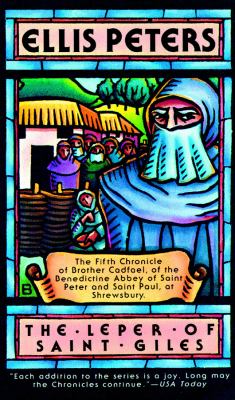 Set
in Shropshire, England in 1139.
Set
in Shropshire, England in 1139.
I found I hadn't purchased book four, so I skipped to book five of the Brother Cadfael series.
Brother Mark has gone to Saint Giles, to minister to the lepers there, and Brother Cadfael misses his former assistant, but does get to see him when he brings his medicines.
It is when they are at Saint Giles when the marriage procession passes by–the groom first, and his betrothed following later.
There is a casual cruelty displayed here that is disturbing to the modern eye, but would have been normal for the term, which in some ways makes it all the more disturbing.
But there are plenty of lovely thoughts as well.
(B)lessedness is what can be snatched out of the passing day, and put away to think of afterwards."
And a passage I particularly liked, during a candle-lit service.
There was something fascinating in the way the light of the candles picked out so sharply every detail of those ministering hands, cut off at the wrist by dark sleeves. So many severed hands moving and acting with a life of their own, the only pallors in the enfolding dimness.
Again, I enjoyed this story, and Brother Cadfael's views of the young and sin.
Characters: Cadfael, Abbot Radulfus, Agnes Picard, Arnulf, Avice of Thornbury, Bran, Mark, Oswin, Eudo de Domville, Gilbert Prestcote, Guy Fitzjohn, Huon de Domville, Baron, Joscelin Lucy, Lady Iveta de Massard, Lazarus, Madlen, Prior Robert, Simon Aguilon, Sir Godfrid Picard, Ulgar the wheelwright
Published by MysteriousPress
- October 2016 | Rating: 8/10
- August 2018 | Rating: 8/10
- July 2024 | Rating: 9.5/10
The Virgin in the Ice (1982) #6
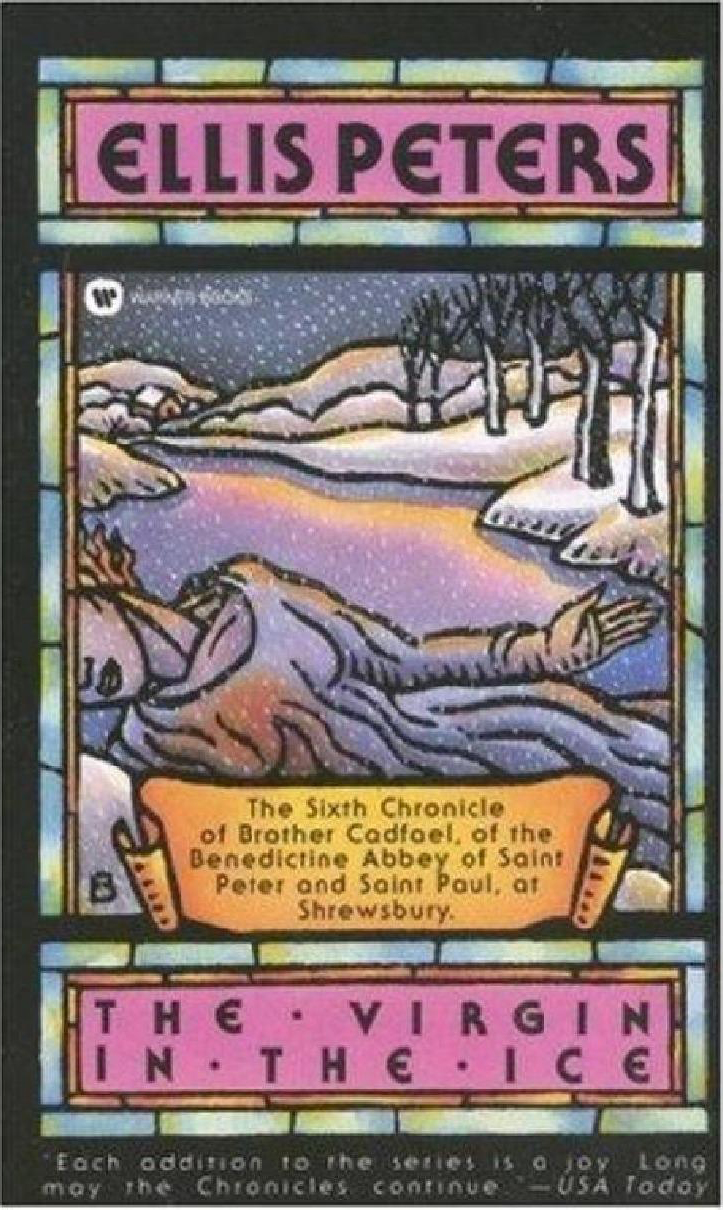 Set in
Worcestershire, England in 1139.
Set in
Worcestershire, England in 1139.
It is winter, and along the border with Wales, this time can be deadly, especially for the poor or travelers caught unaware.
When bandits leave a Benedictine brother for dead in the cold, Brother Cadfael is called to come help, due to his experience during the Crusades. Before he leaves, a request comes from Worcester for help in searching for two siblings and a nun who went missing during the attack by Maud's forces. The guardian of the two is a supporter of Maud, and so is banned from searching himself, upon penalty of arrest.
As always, the mystery takes various twists and turns, never going quite where you expect it, but always Brother Cadfael does what he believes is just and moral.
And leaves you with things to ponder.
To accuse oneself of falling short of infallibility is to arrogate to oneself the godhead thus implied.
What you yourself did, that you may rue, and confess, and do penance for, to your soul's content, but you may not lift another man's sins from his shoulders, or usurp God's right to be the only judge.
Now I'm in a quandary, because there are larger gaps in the books I have, and I have to either skip books, or wait until they go on sale again.
I wonder if Grandmom read this series, because I know she would have enjoyed it.
Characters: Cadfael, Hugh Beringar, Aline Beringar, Giles Beringar, Gilbert Prestcote, Sub-Prior Herward, Prior Leonard, Reyner Dutton, Elyas, Ermina Hugonin, Yves Hugonin, Sister Hilaria, Josce de Dinan, Evrard Boterel, Laurence d’Angers, Olivier de Bretagne, John Druel, Alain le Gaucher
Published by MysteriousPress
- October 2016 | Rating: 8/10
- August 2018 | Rating: 8/10
- July 2024 | Rating: 9/10
The Sanctuary Sparrow (1983) #7
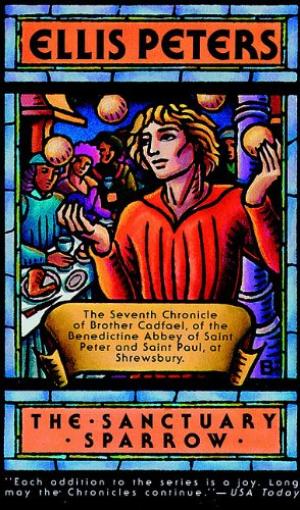 Set in
Shropshire, England in 1140.
Set in
Shropshire, England in 1140.
The seventh Brother Cadfael mystery begins with a mob howling for the blood of a young man chased into the abbey, seeking sanctuary. They claim a man has been killed, and want vengeance.
The abbot holds no truck with violence in the sanctuary, and sends the mob out, and grants the young man his 40 days of sanctuary.
"If the law itself were here, there is no power can now take away this man from the sanctuary he has sought. You should know the right of it as well as I, and the peril, body and soul, to any who dare to breach that sanctuary. Go, take the pollution of your violence out of this holy place. We have duties here which your presence in hatred defiles. Go! Out!"
I do really like this series. Brother Cadfael, having lived a full life before joining the abbey, has a greater understanding of human nature than most of his brothers, and thus a greater sympathy for human foibles than most.
I really like this series, and wish I could share it with Grandmom.
Characters: Cadfael, Abbot Radulfus, Prior Robert, Brother Anselm, Brother Jerome, Brother Oswin, Liliwin, Dame Juliana Aurifaber, Walter Aurifaber, Daniel Aurifaber, Susanna Aurifaber, Margery Aurifaber, Iestyn, Rannilt, Baldwin Peche, John Boneth, Griffin, Cecily Corde, Madog of the Dead-Boat, Hugh Beringar, Aline Beringar
Published by MysteriousPress
- October 2016 | Rating: 8/10
- August 2018 | Rating: 8.5/10
- July 2024 | Rating: 7/10
The Devil's Novice (1983) #8
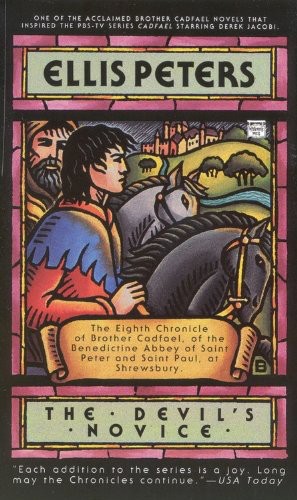 Set in
Shropshire, England in 1140.
Set in
Shropshire, England in 1140.
The 8th Brother Cadfael mystery beings with a discussion of taking on of two oblates–youth given by their father's to the abbey. One youth is an infant, the other an older teen.
It's a reminder of just how different things were that the idea of giving an infant or young child to the church without their having any say in the matter is shocking to the modern reader, but merely seen as a bad idea by brothers by Cadfael.
To be clear, this isn't just giving a child to the church to be educated, but giving the child to be a brother, before they might have any thoughts or feelings in the matter.
"I am not easy in my mind about accepting any more such oblates, when they can have no conception of what they are being offered or, indeed, of what they are being deprived. It is joy," said Radulfus, "to open the doors to a truly committed heart and mind, but the mind of a child barely out of nurse belongs with his toys, and the comfort of his mother's lap."
The young man who is taken by the abbey is soon to be discovered to be somewhat disturbed in the balance of his mind, suffering nightmares and waking those around him with his night terrors. These things lead the older brothers to be suspicious of him, and the other novice to fear him, calling him the Devil's Novice.
Into this comes a tale of a missing a young cleric on a mission for Bishop Henry, and the young novices actions soon bring suspicious upon himself.
One of the things I particularly liked about the young novice, Meriet, is that he, in his actions, is seen to be a good man. Take this passage, from when he is sent to assist Brother Mark at Saint Giles–the hospice for lepers.
He was stooping to reach a hand to the dog-boy winding round his feet, and finding him unable to rise, and therefore unwilling to attempt it, he did not hoist the child willy-nilly, but suddenly dropped to his own nimble haunches to bring himself to a comparable level, and squatted there distressed, intent, listening.
And I still very much like Brother Mark.
One deceit partnered another deceit, both meant to some good end; and if it seemed to Brother Mark that deceit ought not to have any place in the pilgrimage after truth, yet he acknowledged the mysterious uses of all manner of improbable devices in the workings of the purposes of God, and saw the truth reflected even in lies.
I also liked this mystery–it twisted in unexpected ways and reminds you that at a time of civil war, nothing is clean or clear.
Characters: Cadfael, Abbot Radulfus, Jerome, Paul, Mark, Leoric Aspley, Nigel Aspley, Meriet Aspley, Wulfric Linde, Roswitha Linde, Janyn Linde, Isouda Foriet, Gilbert Prestcote, Hugh Beringar, Canon Eluard, Peter Clemence, Harald
Published by MysteriousPress
- October 2016 | Rating: 8.5/10
- August 2018 | Rating: 8.5/10
- September 2024 | Rating: 8.5/10
Dead Man's Ransom (1984) #9
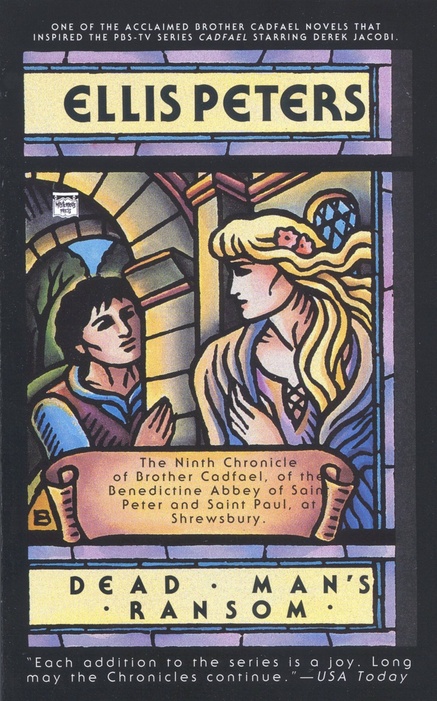 Set in
Shropshire, England and Wales in 1141
Set in
Shropshire, England and Wales in 1141
The civil war continues to tear through England, reaching back towards Shrewsbury, where Hugh and the local sheriff are sent off to fight against the Earls of Chester and Lincoln as well as a marauder from Wales.
When the sheriff is taken, they are lucky to discover that a young man taken during an attempted raid on the nunnery of Godric's Ford.
From an earlier book, we again meet one of the women of the nunnery, and she's even more lively and lovely than she was earlier.
"She may have taken vows of chastity, and what she swears she'll keep. But she has not sworn never to take delight in the looks and converse and company of a proper man. I doubt they'll ever bring her to consent to that, she'd think it a waste and a shame so to throw God's good gifts in his teeth."
To have Mother Mariana's faith in divine protection is good, but even better if backed by the practical assistance heaven has a right to expect from sensible mortals.
Sister Magdalen I especially like because, like Brother Cadfael, she is no longer young (although to Cadfeal she still retains her beauty, which he appreciates in a brotherly way) but she remains strong and powerful–it's lovely to have an older woman play such a strong part, since it happens so infrequently.
I very much also enjoyed the mystery, and how it was sorted out. Brother Cadfeal believes in justice, but he continues to see justice perhaps in a different manner from the law.
Characters: Cadfael, Abbot Radulfus, Edmund, Rhys, Oswin, Gilbert Prestcote, Melicent Prestcote, Sybilla, Lady Prestcote, Hugh Beringar, Aline Beringar, Alan Herbard, John Marchmain, Sister Magdalen, John Miller, Anion ap Griffri, Griffri ap Llywarch, Elis ap Cynan, Eliud ap Griffith, Owain Gwynedd, Cristina merch Tudur, Tudur ap Rhys, Einon ab Ithel
Published by MysteriousPress
- October 2016 | Rating: 9/10
- September 2018 | Rating: 8/10
- September 2024 | Rating: 8.5/10
The Pilgrim of Hate (1984) #10
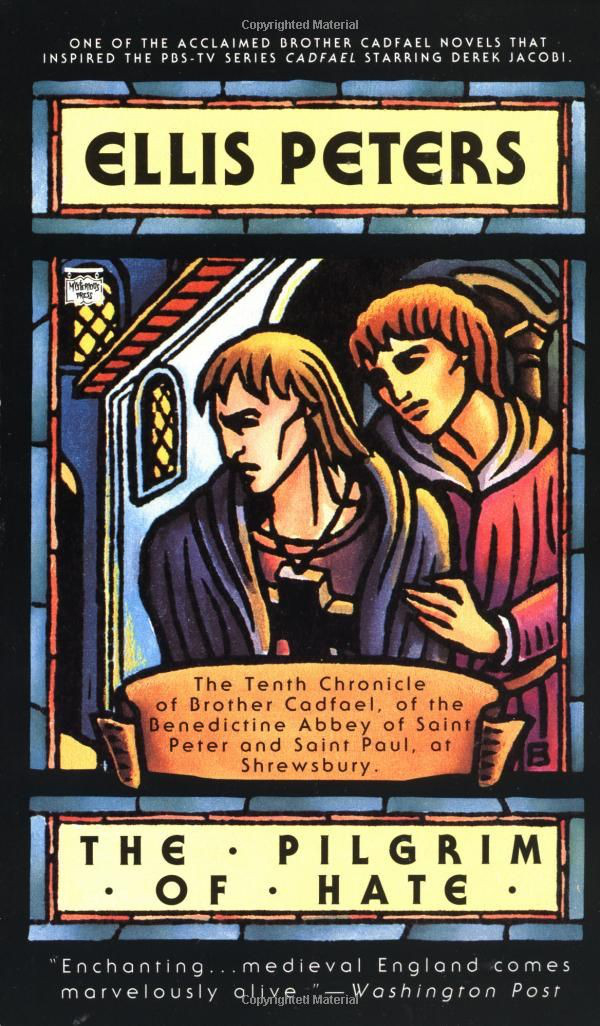 Set in
Shropshire, England in 1141
Set in
Shropshire, England in 1141
The 10th Brother Cadfael novel finds the Abbey preparing for the celebration of Saint Winifred, and pilgrims arriving in hopes of a miracle. This celebration is a reprieve from the civil war that has been tearing up the country for three years.
I find I am learning more than I ever imagined about the English Civil War between King Stephen and Empress Maud (Matilda, daughter of Henry I and mother of Henry II).
It was not one man's death, it was a bitter symbol of the abandonment of law and the rejection of hope and reconciliation.
"No good and honourable man is an enemy, though he may take the opposing side in this dissension. The fealty of this world is not for us…
I especially liked the boy Rhun, who suffers from a twisted leg, and has come on pilgrimage to Saint Winifred at the urging of his aunt and sister. He allows Cadfael to treat his leg–massaging it with ointments and such–trying to relax it after the long limp to Shrewsbury.
"But why for me? In case like mine we come by our thousands, in worse case by the hundred. How dare I ask to be among the first? Besides, what I have I can bear. There are some who cannot bear what they have. The saint will know where to choose. There is no reason her choice should fall on me."
"Then why did you consent to come?" Cadfael asked.
Rhun turned his head aside, and eyelids blue-veined like the petals of anemones veiled his eyes. "They wished it, I did what they wanted."
But mostly I continue to love the character of Cadfael, who is as complicated as those him helps.
Cadfael's opponent reached round, gasping, with a long arm and a vicious dagger, and sliced a dangling streamer out of a rusty black sleeve. Cadfael lay on him with all his weight, held him by the hair, and ground his face into the earth, shamelessly exulting. He would do penance for it some day soon, but now he rejoiced, all his crusader blood singing in his veins.
This is not just a good mystery, but a tale of vengeance and forgiveness and healing.
Characters: Cadfael, Rainald Bossard, Bishop Henry, Hugh Beringar, Aline Beringar, Matthew, Ciaran, Rhun, Melangell, Mistress Alice Weaver, Adam of Reading, Abbot Radulfus, Prior Robert, Denis, Anselm, Oswin, Simeon Poer, John Sure, Walter Baggot, and William Hales, Daniel Aurifaber, Olivier de Bretagne
Published by MysteriousPress
- October 2016 | Rating: 9/10
- September 2018 | Rating: 8.5/10
- October 2024 | Rating 8.5/10
An Excellent Mystery (1985) #11
The town of Winchester has been destroyed in the war between Maud and Stephen, and the people–as well as the Benedictine brothers and nuns–have scattered across the country to wherever they can find refuge. Two monks arrive at the Abbey of Saint Peter and Saint Paul asking to be taken in. The older monk, Brother Humilis, is drawn and ill, and it is around him that this mystery circles.
I do love the character of Cadfael.
Cadfael's warrior blood, long since abjured, had a way of coming to the boil when he heard steel in the offing. His chief uneasiness was that he could not be truly penitent about it. His king was not of this world, but in this world he could not help having a preference.
There is, as in all the books, of theme of forgiveness, but in this mystery especially, things are not as they seem, and even in figuring out the mystery, there was still a joy in seeing how things would be resolved.
Characters: Brother Cadfael, Hugh Beringar, Brother Humilis / Godfrid Marescot, Brother Fidelis, Brother Rhun, Abbot Radulfus, Brother Urien, Brother Simon, Brother Edmund, Prior Robert, Brother Jerome, Brother Porter, Brother Oswin, Lady Julian Cruce, Reginald Cruce, Humphrey Cruce, Adam Heriet, Edric Heriet, Nicholas Harnage, Bishop Henry of Winchester, Sister Magdalen, Aline Beringar, Constance, Giles Beringar, Madog of the Dead Boat, John Bonde, Earl Warin, Arnulf, Wulfric, Renfred, Aunt Elfrid, Sister Magdalen, Aelred
Published by MysteriousPress
- October 2016 | Rating: 8/10
- October 2018 | Rating: 7.5/10
- October 2024 | Rating: 9/10
The Raven in the Foregate (1986) #12
The 12th Brother Cadfael mystery finds a new priest come to the local parish–a priest sent by bishop Henry of Winchester. Although he is educated and pious, it soon becomes clear that he is not well suited to being a parish priest.
(T)here were those who found that zeal too narrowly channelled, and somewhat dehydrated of the milk of human tolerance.
"My lord, there's a decent poor man of this parish, Centwin, whose wife Elen bore a very weakly child, a boy, four days ago. It was about Sext when the baby was born, and it was so small and feeble, they were sure it must die, and Centwin ran quickly to the priest's house, and begged him to come and baptise the boy before he died, that his soul might be saved. And Father Ailnoth sent out word that he was at his devotions, and could not come until he had completed the office. Centwin begged him, but he would not interrupt his prayers. And when he did go, Father, the baby was dead." The small, chill silence seemed to bring down a looming darkness on the panelled room. "Father, he would not give the child Christian burial, because it was not baptised. He said it could not come within the hallowed ground, though he would say what prayers he could at its burial— which was in a grave outside the pale."
When Father Ailnoth is found drowned, there is plenty of suspicion to go around as to who might have killed him.
Radulfus brooded for some minutes over the indifferent corpse which had been Father Ailnoth, and never before so still and quiet, so tolerant of the views of others.
(I)t is not enough to abstain from evil, there must also be an outgoing goodness. The company of the blessed may extend justifiably to embrace even men who have been great sinners, yet also great lovers of their fellow men, such as have never turned away their eyes from other men's needs, but have done them such good as they might, and as little harm as they must.
These really are lovely stories.
Characters: Cadfael, Abbot Radulfus, Aline Beringar, Benet, Jerome, Cynric, Diota Hammet, Eluned, Father Ailnoth, Hugh Beringar, Ninian Bachiler, Prior Robert, Ralph Giffard, Sanan Bernières, Torold Blund
Published by MysteriousPress
- October 2016 | Rating: 8/10
- October 2018 | Rating: 7/10
- November 2024 | Rating: 8/10
The Rose Rent (1986) #13
The 13th Brother Cadfael mystery revolves around a property that had been donated to the Abbey by a widow, with an unusual stipulation.
One white rose from that bush in her old garden, to be delivered to her on the day of Saint Winifred's translation—"
This story also looks sideways at child oblates, children who are given to an abbey at a very young age, and given no choice in the matter of taking orders.
No more oblates, the abbot was reflecting ruefully, and thanking God for it. No more taking these babes out of their cradles and severing them from the very sight and sound of women, half the creation stolen out of their world. How can they be expected to deal capably at last with something as strange and daunting to them as dragons? Sooner or later a woman must cross their path, terrible as an army with banners, and these wretched children without arms or armour to withstand the onslaught
The story revolves primarily around the wealthy young widow, who is sought by the men of the area for her wealth, but who for herself doesn't want to remarry.
The partnership between the two families for business purposes had existed for two generations, and made close contact plausible even for this young sprig who was said to be at odds with his father, and highly unlikely to prove a third successful woolman, his talent being more highly developed in spending the money his father made.
This mystery ranges all over, but like a previous mystery, makes note of the place of women in society and how their reputations could be everything.
Justice is a very fine thing, but not when it does more harm to the victim than to the wrongdoer.
But what I like best about the series is the redemption and look at what leads people to crime.
Strange!" she said, frowning over things now beyond help or remedy. "When he went out, he did not seem to me evil, or malicious, or aware of guilt. Only bewildered! As though he found himself where he had never thought or meant to be, in some place he could not even recognise, and not knowing how he made his way there."
There is little true evil, I think. Something we forget when set those who commit evils (or even what we see as wrongs) aside as other.
Characters: Cadfael, Abbot Radulfus, Agatha Coliar, Alan Herbard, Bertred, Branwen, Anselm, Eluric, Edwy Bellecote, Godfrey Fuller, Hugh Beringar, Judith Perle, Madog of the Dead-Boat, Miles Coliar, Niall, Sister Magdalen, Vivian Hynde
Published by MysteriousPress
- October 2016 | Rating: 8/10
- December 2018 | Rating: 7/10
- November 2024 | Rating: 8/10
The Hermit of Eyton Forest (1987) #14
The 14th Brother Cadfael book sees the Civil War still causing problems, and sees further reversals between the two contestants for the throne.
Back at the Abbey, Cadfael has a new helper, another young novice.
"Yes, I should think he might do very well," he said, impressed and amused, "whether with a spade or a battle-axe. I could do with a dozen such at the castle whenever they care to offer their services."
"He'd be no use to you," said Cadfael with certainty. "Like most big men, the gentlest soul breathing. He'd throw his sword away to pick up the man he'd flattened. It's the little, shrill terriers that bare their teeth."
This book focuses on one of the young students of the Abbey, in this case a young boy who has just become heir to his estates, at the death of his father. But our first glimpse is of him being just a young boy.
He'll have taken the biggest, but only four. He thieves in moderation. Partly from decent obligation, partly because half the sport is to tempt providence again and again."
Hugh's agile black eyebrow signalled amused enquiry. "Why four?"
"Because we have but four boys still in school, and if he thieves at all, he thieves for all.
One thing about this story–it's sometimes easy to see who might end up dead, because even if they are not drawn as evil, they aren't necessarily drawn as kind.
(T)he face of a man not in anger at this moment, but always ready to be angry.
It hard to be sad at the death of a man described as such (and in action just as unpleasant).
A hermit has come to the estate that the young boy has inherited, and he seems willing to help the young boy's grandmother who wants the boy not at school to continue his learning, but home and immediately married, to increase the family estates.
This is actually a fascinating turn on the usual story of a young girl being forced into an unwanted marriage.
Cadfael remains a lovely character.
Worse, Hugh, I do not repent me! Do you suppose there is room within the bounds of grace for one who has set his hand to the plough, and every little while abandons his furrow to turn back among the sheep and lambs?"
I really do like this series.
Characters: Cadfael, Abbot Radulfus, Annet, Aymer Bosiet, Jerome, Paul, Winfrid, Cuthred, Dame Dionisia Ludel, Drogo Bosiet, Eilmund, Hiltrude Astley, Hugh Beringar, Hyacinth, John of Longwood, Prior Robert, Rafe of Coventry, Renaud Bourchier, Richard Ludel, Sir Fulke Astley, Sir Richard Ludel, Warin
Published by MysteriousPress
- October 2016 | Rating: 8/10
- January 2019 | Rating: 7/10
The Confession of Brother Haluin (1988) #15
Brother Haluin came to the abbey as a novice, and as a brother did penance beyond what it was believed he owed.
But there are some born to do penance by nature. Maybe they, lift the load for some of us who take it quite comfortably that we're humankind, and not angels. If the overflow from Haluin's penitence and piety washes off a few of my shortcomings, may it redound to him for credit in the accounting. And I shan't complain."
But when a terrible accident brings him to death's door, his confession brings to light an old death that was more than an accident but less than murder.
I do enjoy Cadfael's view of the world.
Cadfael saw the ashes of great beauty. No, not ashes, embers, still alive and as hot at least as the coals burning in the heart of the brazier.
What was interesting is that I saw pretty quickly where things were going, but still enjoyed the mystery, and there were still surprises in store, even guessing major plot points as I did.
As always, there were passages that reached out to me.
The funereal ceremonies do as much for the living as for the dead, in occupying their hands and minds, and consoling them for things left undone or badly done during life.
Funerals are for the dead, not for the living.
I really like this series.
Characters: Brother Cadfael, Abbot Radulfus, Hugh Beringar, Brother Conradin, Brother Winfrid, Brother Simeon, Brother Urien, Brother Haluin, Brother Edmund, Brother Rhun, Brother Luke, Bertrade, Bertrand de Clary, Adelais de Clary, Audemar de Clary, Father Wulfnoth, Gerta, Lothair, Luc, Edwin, Roscelin Vivers, Cenred Vivers, Helisende Vivers, Emma Vivers, Edgytha, Edric, Madlyn, Jean de Perronet, Sister Ursula, Sister Benedicta, Mother Patrice
Published by MysteriousPress
- November 2016 | Rating: 8/10
- January 2019 | Rating: 7/10
- December 2024 | Rating: 8/10
The Heretic's Apprentice (1989) #16
William of Lythwood has returned from his pilgrimage to the Holy Land in a coffin. He died of illness on his return home, and his attendant Elave has brought his body back to his family. However, a visiting cleric raises doubts as to whether the man should be buried at the abbey when he learns that he was once chastened for heretical views.
'There were certain small points at issue,' Serlo said submissively, 'as I remember it. Two in particular, besides his doubts concerning the baptism of infants. He had difficulty in comprehending the Trinity…'
Who does not! thought Cadfael. If it were comprehensible, all these interpreters of the good God would be out of an occupation. And every one of those denies the interpretation set up by every other.
These views soon reach out to tar Elave as well, and when a body appears, things begin to look at the darker for the young man.
'I do not deny divine grace. The grace is in the gifts he has given us, free will to choose good and refuse evil, and mount towards our own salvation, yes, and the strength to choose rightly. If we do our part, God will do the rest.'
Saint Augustine, of whom Cadfael was not as fond as he might have been. There is a certain unbending rigidity about Augustine that offers little compassion to anyone with whom he disagrees. Cadfael was never going to surrender his private reservations about any reputed saint who could describe humankind as a mass of corruption and sin proceeding inevitably towards death, or one who could look upon the world, for all its imperfections, and find it irredeemably evil.
Not that Cadfael doesn't have heretical leanings himself, but he does his best for the young man, whom he believes is being unjustly persecuted.
And as always, there is no black and white, no evil at the root of murder and divisiveness.
Cadfael had a sudden startling insight into a mind utterly alien to his own. For the man really had, somewhere in Europe, glimpsed yawning chaos and been afraid, seen the subtleties of the devil working through the mouths of men, and the fragmentation of Christendom in the eruption of loud-voiced prophets bursting out of limbo like bubbles in the scum of a boiling pot, and the dispersion into the wilderness in the malignant excesses of their deluded followers. There was nothing false in the horror with which Gerbert looked upon the threat of heresy,
'I do believe we have been given free will, and can and must use it to choose between right and wrong, if we are men and not beasts. Surely it is the least of what we owe, to try and make our way towards salvation by right action. I never denied divine grace. Surely it is the greatest grace that we are given this power to choose, and the strength to make right use of it. And see, my lord, if there is a last judgement, it will not and cannot be of God's grace, but of what every man has done with it, whether he buried his talent or turned it to good profit. It is for our own actions we shall answer, when the day comes.'
I think I actually enjoyed the theology here even more than the mystery.
Characters: Brother Cadfael, Abbot Radulfus, Prior Robert, Brother Anselm, Brother Haluin, Brother Jerome, Brother Denis, Brother Edmund, Brother Rhun, Brother Winfrid, Brother Benedict, Brother Oswald, Brother Haluin, Brother Porter, Canon Gerbert, Aldwin, Conan, Elave, Father Boniface, Father Eadmer, Young Eadmer, Father Elias, Hugh Beringar, Aline and Giles Beringar, William of Lythwood, Jevan of Lythwood, Girard of Lythwood, Fortunata, Margaret, Madog of the Dead-Boat, Serlo, William Warden, Bishop Roger de Clinton
Published by MysteriousPress
- November 2016 | Rating: 9/10
- February 2019 | Rating: 8.5/10
- December 2024 | Rating: 9/10
The Potter's Field (1989) #17
The war between King Stephen and Empress Maud continues, and raiders have attacked East Anglia, sending the residents and the local Benedictines fleeing. The novice Sulien Blount is sent back to Shrewsbury both to escape the raiders and to consider whether he truly wants to take orders.
When a plot of land comes into the Benedictines of Saint Peter and Saint Paul (through a trade with another religious house), the Benedictines decide to plow the land to prepare it for the coming spring.
A new monk–a potter who took orders against the will and wishes of his wife–formerly lived on that land, so when the body of a woman is discovered, suspicions turn to Brother Ruald.
I think Radulfus had his doubts at first. He kept him the full term and over in his novitiate. His desire was extreme, and our abbot suspects extremes. And then, the man had been fifteen years married, and his wife was by no means consenting. Ruald left her everything he had to leave, and all of it she scorned. She fought his resolve for many weeks, but he would not be moved.
…(H)e could have his freedom to go and become a monk, but his going didn't confer freedom on her. She could not take another husband; the one she had, monk or no, was still alive.
That's a hard thing–that a man could make such a decision and his wife could not only have no say in the matter, but would also remain bound by their marriage vows.
We also meet Donata Blount, who has been slowly dying for years (one would presume from the descriptions, of a cancer). Her struggle is one that may be familiar to many, and the worries and fears she had are little different from those we see today.
…I foresaw a time when the load would become more than even I could bear, and I wished to have some small thing about me, a little vial of deliverance, a promise of peace, perhaps never to use, only to keep as a talisman, the very touch of it consolation to me that at the worst… at the last extreme, there was left to me a way of escape. To know that was to go on enduring. Is that reproach to me, Father?"
But it's not all dark. There are as always some lovely passages of tranquility, like this bit where Cadfael visits his godson.
He made Cadfael free of the amenities of his manor with solemn dignity, seated him ceremoniously, and himself made off to the buttery to fetch a beaker of ale, bearing it back cautiously in both still-rounded, infantile hands, overfilled and in danger of spilling, with his primrose hair erect and rumpled, and the tip of his tongue braced in the corner of his mouth.
And of course, Cadfael is Cadfael.
Cadfael had barely begun to close the door upon the pair of them, admittedly slowly and with pricked ears, when the abbot's voice cut sharply through the boy's breathless utterance.
As with the other books, there is a love story, and there is also a story of forgiveness and redemption.
I really love this series.
Characters: Brother Cadfael, Abbot Radulfus, Hugh Beringar, Aline Beringar, Giles Beringar, Britric of Ruiton, Brother Ruald, Brother Jerome, Brother Oswin, Brother Paul, Prior Robert, Brother Matthew, Brother Richard, Brother Matthew, Brother Anselm, Brother Ambrose, Brother Winfrid, Brother Urien, Abbot Walter, Brother Daniel, Brother Vitalis, Brother Petrus, Brother Francis, Father Ambrosius, Donata Blount, Eudo Blount, Sulien Blount, Generys, Walter Reynold, Gunnild, Pernel Otmere, Giles Otmere, Robin, John Hind, Master William Rede, Will Warden, Alan Herbard, Nigel Apsley
Published by MysteriousPress
- November 2016 | Rating: 9/10
- April 2019 | Rating: 8.5/10
- January 2025 | Rating: 8.5/10
The Summer of the Danes (1991) #18
This story is quite different from others in this series. Like the first, it is set in Wales, but instead of a peaceful search for a saint, there is a possibility of a fight between brothers and then invasion (by the Danes of the title).
I didn't realize that the Danes controlled Ireland at times. I suppose I shouldn't be surprised, but I just never knew it.
his grandmother had been a princess of the Danish kingdom of Dublin, more Norse than Irish, Ragnhild, a granddaughter of King Sitric Silk-Beard, and his mother.
I was also fascinated by the politics and laws of that place and time.
"Brothers have been the ruin of Welsh princedoms through all ages," Cadfael observed ruefully. "Welsh princes should have only one son apiece. The father builds up a sound principality and a strong rule, and after his death his three or four or five sons, in and out of wedlock, all demand by right equal shares, and the law says they should have them. Then one picks off another, to enlarge his portion, and it would take more than law to stop the killing."
Cadfael, of course, remains himself–curious and kind and well-aware of his own faults and failings (not that I'd particularly consider them such).
It was a matter of principle, or perhaps of honour, with Brother Cadfael, when a door opened before him suddenly and unexpectedly, to accept the offer and walk through it.
It is a blessed thing, on the whole, to live in slightly dull times, especially after disorder, siege and bitter contention.
There is no one who cannot be hated, against whatever odds. Nor anyone who cannot be loved, against all reason.
This is a marvelous series, and each book is as good as the previous.
Characters: Brother Cadfael (Cadfael ap Meilyr ap Dafydd), Abbot Radulfus, Deacon Mark, Brother Winfrid, Brother Oswin, Brother Dafydd, Anarawd ap Gruffydd, Bishop Gilbert, Bishop Meurig, Bledri ap Rhys, Cadwaladr, Canon Meirion, Canon Morgant, Cuhelyn ab Einion, Gwion, Heledd, Hugh Beringar, Hywel ab Owain, Ieuan ab Ifor, Leif, Otir, Owain Gwynedd, Rhun ab Owain, Turcaill son of Turcaill
Published by MysteriousPress
- November 2016 | Rating: 9/10
- May 2019 | Rating: 8.5/10
- January 2025 | Rating: 8.5/10
The Holy Thief (1992) #19
Two very different groups have stopped by the Benedictine abbey: a troubadour and his entourage, and a brother and a novice from Ramsey–seeing funds and help to rebuild the abbey and the city there, destroyed by Geoffrey de Mandeville, Earl of Essex.
But a flood in Shrewsbury throws everything into confusion, as the brothers move to put Saint Winifred and other holy items someplace above the possible flooding.
As is obvious from the title, Saint Winifred's casket disappeared in the chaos of the flooding.
It's obvious who has caused Saint Winifred to disappear, but there is still a good deal of mystery here, and surprises to the end.
We also meet again Donata Blount, who has now not much longer to live.
this woman was now so closely acquainted with death that the subtle creaking of the opening door was present in her voice, and the transparent pallor of the bodyless soul in her face.
I was delighted we got to see her again, even if only for her death.
He would raise sons in his own image, and the earth would be glad of them.
And there are now only two books left in the series, so as is my wont, I'm going to leave this series and return to it later.
Characters: Brother Cadfael, Hugh Beringar, Abbot Radulfus, Brother Anselm, Brother Denis, Brother Rhun, Brother Jerome, Brother Richard, Prior Robert, Brother Paul, Brother Urien, Brother Matthew, Brother Porter, Brother Tutilo, Brother Vitalis, Sub-Prior Herluin, Donata Blount, Abbot Walter, Sulien Blount, Pernel Otmere, Eudo Blount, Rémy of Pertuis, Bénezet, Daalny, Nicol, Father Boniface, Cynric, Gregory, Lambert, Aldhelm, Master James of Betton, Martin, Roger from Ramsey, Payne, Robert Beaumont / Robert Bossu, Waleran Beaumont, Aline BeringarPublished by MysteriousPress
- November 2016 | Rating: 9/10
- May 2019 | Rating: 9/10
- February 2025 | Rating: 7.5/10
Brother Cadfael’s Penance (1994) #20
This is the third time I have read this series through, but the first time I read Brother Cadfael’s Penance, the final book in the series (there is an anthology of short stories I still have to read). I have this weird thing about not wanting to finish series, which it’s taken my almost nine years to finish this one.
The problem is that this series was my bedtime reading, since cozy mysteries are good for that. Except, I hadn’t read this book before, so I didn’t know what was going to happen, so it was a terrible bedtime book.
The backdrop of this series is the Anarchy, or the war between Empress Maud (Matilda, Daughter of Henry I & mother of Henry Plantagenet/Henry II) and Stephen of Blois (1138 and 1153), and like One Corpse Too Many, that war is front and center in this book.
The voices of cold reason were talking, as usual, to deaf ears.
Stephen’s faction has taken prisoners, including Olivier de Bretagne, who is unaccounted for. Cadfael gets leave to go to Coventry with Hugh where he can seek where Olivier is being held, but Cadfeal is to return with Hugh after.
When Cadfael learns of Olivier’s location, he breaks his obedience and sets out in search of both Olivier and Yves Hugonin (The Virgin in the Ice) who has been accused of murder.
Both Maud and Stephen are in this story, and although we have heard tell of their flaws throughout the series, we see those flaws in action here.
‘No!’ said the empress sharply. ‘I will not stir for one captive, the risk is too great, and too little to gain. It was presumptuous to ask it of me.
It is clear neither will compromise, and that the war will continue to grind the county to pieces.
Although Cadfael, Olivier, and Yves are main characters, the story truly centers of Philip, who has tired of seeing the country torn apart, and switches sides in the hope it would help bring about peace. (Spoiler: it doesn’t.)
He moved in silence, with a kind of contained violence, as if his mind was forcing his body into motion as the only means of relief from the smouldering turmoil within.
As with much of the rest of the series, a central theme is redemption and forgiveness, and as always, Cadfael’s beliefs and views are pragmatic, and probably not so strange at a time when the church was undergoing change, trying to fold the Celtic church into the Roman church.
If the sin is one which, with all our will to do right, we cannot regret, can it truly be a sin?
It’s a good series, and I will try and savor the stories
Characters: Brother Cadfael, Philip FitzRobert, Yves Hugonin, Olivier de Bretagne, Ermina Hugonin, Hugh Beringar, Abbot Radulfus, Brother Winfrid, Prior Robert, Brother Edmund, Brother Anselm, Brother Jerome, Brother Porter, Reginald FitzRoy, Bishop Roger de Clinton, Bishop Henry of Blois, Bishop Nigel of Ely, Ranulf of Chester, King Stephen, Empress Maud, Brien de Soulis, Robert Beaumont / Robert Bossu, William Martel, William of Ypres, Earl Robert of Gloucester, Jovetta de Montors, Isabeau, Robert de Vere, Roger of Hereford, Hugh Bigod, Brother Eadwin, Forthred of Todenham, Richard de Clare, Geoffrey FitzRichard of Clare, King David of Scotland, Humphrey de Bohun, John FitzGilbert, The Miller of Winstone, Guy Camville
Publisher: MysteriousPress
- March 2025 | Rating: 8/10



